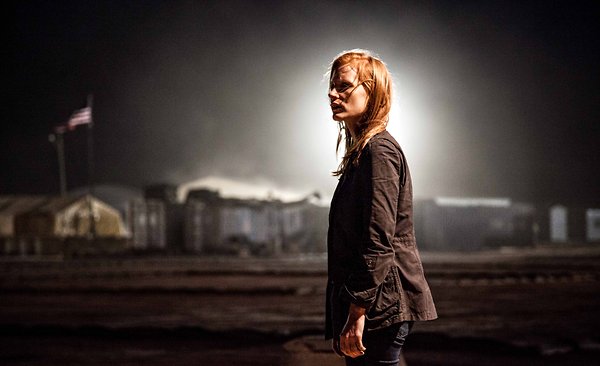23 January 2013
Directed By: Kathryn Bigelow
Starring: Jessica Chastain, Jason Clarke, Kyle Chandler, Jennifer Ehle, Edgar Ramirez and Mark Strong
What It’s About: The CIA employs all its efforts to find and kill Al-Queda leader Osama Bin Laden.
Rated R (for strong violence including brutal disturbing images, and for language)
Runtime: 157 minutes
By Aaron Sanders, Diversions Editor
You’ve heard the story. Or, as the marketers for Zero Dark Thirty claim, you think you’ve heard the story. In 2011, a special operations team went into Pakistan, invaded a secret compound and assassinated Al-Qaeda leader Osama Bin Laden (referred to as UBL). Most will remember droves of gung-ho Americans on CNN storming the streets of Washington D.C. in celebration and the families of 9/11 victims claiming closure in the death of the despicable villain. However, very few people are actually aware of how meticulous a process tracking down UBL was.
Zero Dark Thirty opens with a torture-interrogation scene and introduces the centerpiece of the film, Maya (Jessica Chastain). Maya is a CIA operative recruited straight out of high school. She is the best at what she does. She is scrupulous, tenacious and, as the politicians in Washington D.C. put it, “killer.” She has no friends, no lover, no interests outside of her job. Her white porcelain skin and fragile voice complement the sheer ferocity that lies within. In the aforementioned torture scene, a chained and battered terrorist pleas for mercy from Maya, and as she approaches him with what seems like a glimmer of compassion, she instead tells him: “You can help yourself by being truthful.”
Zero Dark Thirty is just as much about Maya as it is about catching Bin Laden. It is about what Maya represents, how much of oneself one puts into what one does, which is in this case hunting down a terrorist. Maya represents a state of mind that has pervaded the lives of a handful of Americans: people who are defined not by who they are, but by what they do, people who merely exist to do a job. Like Sergeant William James of Bigelow’s last film The Hurt Locker, Maya sticks out like a sore thumb from her colleagues. While James was unique in his overt enthusiasm to diffuse bombs, Maya is unique in her meticulous work ethic and obsessive compulsion to find Osama Bin Laden.
The hunt for Bin Laden was not an exciting spy intrigue filled with glamorous disguises and flashy firefights; it was painstaking, calculated and entirely dependent on dumb luck. Hundreds of prisoners, contacts and other “reliable sources” came and went, years dragged by and billions of dollars were spent. By the time the CIA finds Bin Laden, everyone is reluctant to believe it. That is, everyone except for Maya, who, in one of the most memorable scenes in the film, is “100 percent” confident that they have Bin Laden in their crosshairs.
The final act of the film is the now-famous raid on Bin Laden’s compound by an enthusiastic team of Navy SEALs and the iconic stealth helicopters. The raid on the compound is extremely intense. Even knowing the outcome, one cannot help but be brought to the edge of one’s seat. Those expecting a resounding “OORAH!” or some other nationalistic call sign when the deed is done will instead be washed with a wave of emptiness, for no acts of retaliation can heal the wounds left by Osama Bin Laden.
Now that her job is done, Maya is free to go where she pleases, to go on with life, but she does not want to go home. Does she really even have a home? War is all she knows. It has become what she is and, again like Jeremy Renner’s James, finds she has no place in the world. However, unlike Sergeant William James, she cannot merely sign up for another tour of duty. Before the credits roll and her story ends, the last thing she can do is cry in realization that Osama Bin Laden is finally dead.
9/10
Courtesy of graphics8.nytimes.com and img2-3.timeinc.net


